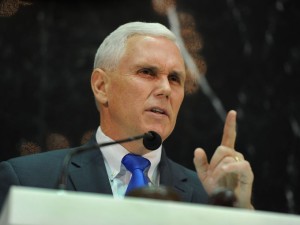 Mike Pence the Indiana Governor vigorously defended the religious objections legislations that he signed on Thursday into law as organizations and businesses including the NCAA expressed concerns it could allow for legalizing discrimination against people who are gay.
Mike Pence the Indiana Governor vigorously defended the religious objections legislations that he signed on Thursday into law as organizations and businesses including the NCAA expressed concerns it could allow for legalizing discrimination against people who are gay.
Indiana is the first state to put such a change into law this year amongst about 12 where proposals have just been introduced.
On Thursday, the governor of Arkansas said he supported a bill that was similar that was advancing in the legislature of the state.
He added that the bill was not about discrimination and if he thought it had legalized discrimination he would have vetoed the legislation.
The arguments did not satisfy the law’s opponents who are worried that the law, which takes effect this July, presents the state as unwelcoming and gives cover legally to businesses that do not want to give services to lesbians and gays.
Gay right advocates consider the bill in Indiana amongst the most sweeping of other state proposals that are similar introduced as conservatives are bracing for a possible ruling by the U.S. Supreme Court legalizing same-sex marriage across the nation.
Those opposed to the law said that it basically says that as long as your religion tells you to it is ok to discriminate against people despite how the law reads.
The NCAA based in Indianapolis said it is concerned about this legislation and was having it examined to see how it might affect their future events as well as its workforce.
Marc Benioff the CEO at Salesforce.com, said soon after the law was signed, that he was cancelling every program that required customers or their employees to travel into Indiana to face any discrimination.
